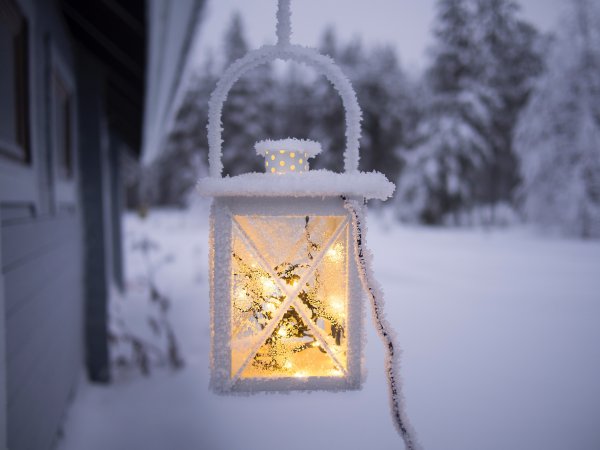
How to Prep a Mountain Cabin for the Winter Holidays

It’s still Autumn – the leaves are crunchy and turning golden and there’s still some heat left in the early morning sunlight. If you’re planning an adventurous winter holiday come December or January – whether for New Year’s Eve, Hanukkah or Christmas – you are probably already starting to look into making some reservations. A winter holiday spent somewhere in a mountain cabin is something to look forward to for months.
Imagine the woods, the snow falling silently on the trees and a roaring fire in the fireplace welcoming you home from a snowshoeing excursion. There is nothing more peaceful than realising that you have nowhere to go and burying yourself deeper under the blankets with a good book to get lost in as snow continues to fall on your parked car.

In order to reach this level of zen, you need to prepare properly. There is nothing worse than putting a tea kettle on and realising there’s no propane. Or that last night’s storm has damaged the power lines and there is no light to read your tattered Jack London by. Or that the fire you’ve been dreaming about just won’t light, because the wood is damp or you used your last match on a sparkler the night before!
Here is a fool proof checklist to go over when going to a winter cabin – whether it’s yours or rented. It will keep your head cool and your feet warm while you sit in front of the fire and drink hot cocoa.
Cooking, baking and hot chocolate
There are several major areas that you should have absolutely covered in your cabin. One of them is the food, the hot chocolate, tea and coffee – or more specifically, how you’re going to make them. Think of what fuel sources you have available to you and make sure you have enough, and that you have a backup. No fun eating raw carrots and gulping them down with cold water for your evening meal. At a secluded cabin, there are a few fuel sources to consider:
Gas – this is a very convenient heating method for secluded cabins or homes. If you have a large tank of propane you can even use it to run your fridge, water heater or your backup generator. And you’re basically power-outage immune. It’s a good idea to have large residential propane tanks filled before winter begins. If you are using a small portable propane tank make sure to have at least two spares just in case you get snowed in. Test your tanks for leaks by applying a layer of soapy water around the valves and look for air bubbles. Inspect all of your connectors and make sure they’re working properly. It is important to ensure your home has enough propane, so look for a propane gas delivery or a propane tank delivery service that can meet your residential propane tank refill needs.
Wood – an old favourite, for thousands of thousands of years. For most small mountain cabins that don’t have a gas or electric heaters this will be the only source of warmth, so you better make sure you are stocked up! If you own the property, you should start ordering seasoned wood well in the fall. If you are visiting or renting, make sure to ask the owner where the firewood is, if its’ seasoned and ready for use, or if you need to bring your own. If you need to bring your own, always bring more than you think you will use. Order online – you can order wood online by the cord. A cord of wood is 4 feet by 4 feet wide by 8 feet long. A cord should last you about a month. Depending on what type of wood you’re buying and where you live, you can expect to pay anywhere from 120$ to 300$ per cord. But, better safe than sorry.
Electricity – if you have electricity hooked up to your cabin consider yourself lucky. However, unless you have solar panels, chances are that during a snowstorm the power might go down. It might take a while to repair, and sometimes candles can only get you so far. You should definitely stock up on candles though – and flashlights, camping lanterns and if you are a romantic, hurricane lamps are a big hit. Just make sure you have enough fuel for them. If you are the cabin owner it’s a good idea to figure out the best home standby generator that’s available to you, and choose one according to size and capacity. Figure out how much power fits your needs and invest wisely. It can mean the difference between misery and luxury when you’re snowed in. And as always, make sure to have enough fuel for it to last. This will keep any electrical appliances like refrigerators, ovens, stoves and heaters going during a serious power outage and you can rest easy, cook your favourite comfort food and forget about the cares of the outside world.
Food
Make-Ahead – while roasting marshmallows and preparing hot chocolate are the staples of all winter getaways, slaving over pots and pans isn’t. Make it easy on yourself and bring stews and warming soups in containers. Then just pop them open and warm them up on the stove and voila – no waiting, no mess, and instant gratification. Especially if you just come in from the cold!
Bake ahead – if you love luxurious breakfasts than it’s a good idea to bring crepe dough in bottles. It keeps well for a few days, and then when you’re ready all it needs is a hot pan. If you have a freezer, bring half baked frozen bread or breakfast rolls – you’ll have warm, crusty baked goods straight out of the oven in the morning!
Dried and powdered – if you don’t have a refrigerator in your cabin and you’re too nervous about wild animals to keep your food outside (snow is the original refrigerator) bringing food that won’t spoil is the key. Powdered milk, dehydrated vegetables and berries, dry cereals, beans and groats, powdered mashed potatoes are the key to survival.
Tools, Clothes and Survival
The basics – you should have certain tools with you just in case. A basic list includes: a saw, an ax, a basic toolbox, a first aid kit, cold medication, painkillers, sunblock (very important in the snow!) waterproof matches, firestarter, signal flare, emergency blanket, water filter, pocket knife, shovel and an emergency hand wind radio.
Emergency clothes – have an absolute emergency pair of warm clothes ready and stashed away – make sure they’re thick and preferably woollen. Just in case!
Emergency contact – Have a fully charged emergency phone or extra charged batteries.
Games – bring board games, books, drawing pads and other non-electronic entertainment. Not only for if the power is out, but to help you remember what socialising with other humans is like. This is a good time to toss your phone, or just turn it off and forget about it for a while.
Don’t forget to tell people where you’re going just in case – and have a secluded, relaxing time!
![]()















































